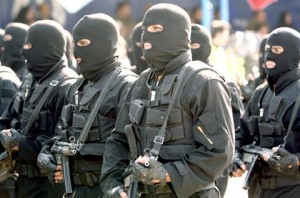
Khartoum (AFP) – The visit of two Iranian naval ships to Sudan reflects strong ties between the countries, Sudan’s military said on Tuesday after Khartoum denied Iranian involvement in weapons manufacturing.
Sudan’s links to Iran have come under scrutiny after Khartoum accused Israel of sending four radar-evading aircraft to strike the Yarmouk military factory in the heart of the capital at midnight on October 23.
The factory compound exploded and burst into flames, and speculation followed that Iranian weapons were stored or manufactured there.
Sudan’s foreign ministry on Monday denied that Iran had any involvement in the Yarmouk factory. It accused Israel of “spreading fabricated information.”
On a visit to Tehran last August, President Omar Al-Bashir described the relationship between Sudan and Iran as “deeply rooted.”
“Two Iranian navy ships are visiting Port Sudan until Wednesday,” army spokesman Sawarmi Khaled Saad told the official SUNA news agency.
The visit of the two ships will support strong political, security and diplomatic relations between the two states. Saad said the port call is a chance for Sudanese naval personnel “to see advanced weapons and advanced ships,” which will also be open to the public.
The Pakistani, Egyptian and Indian navies earlier visited Sudan, he added.
Iran’s Press TV reported that the vessels, the helicopter carrier Kharg and destroyer Admiral Naqdi, arrived at Sudan’s Red Sea port on Monday.
The ships were sent to the Djibouti area in September “to convey Iran’s message of peace to the regional countries and maintain the security of shipping corridors against maritime terrorism,” Press TV said.
Israel refused all comment on Khartoum’s allegations about the factory blast.
But a top Israeli defence official, Amos Gilad, said last week that Sudan “serves as a route for the transfer, via Egyptian territory, of Iranian weapons to Hamas and Islamic Jihad terrorists.”
On Saturday, a US-based non-profit monitoring group said craters at the scene of the explosion were consistent with the kind of damage created by the impact of air-delivered munitions.
The Satellite Sentinel Project started by Hollywood star George Clooney said satellite imagery showed six large craters, each approximately 16 metres (52 feet) across, at the Yarmouk plant.

